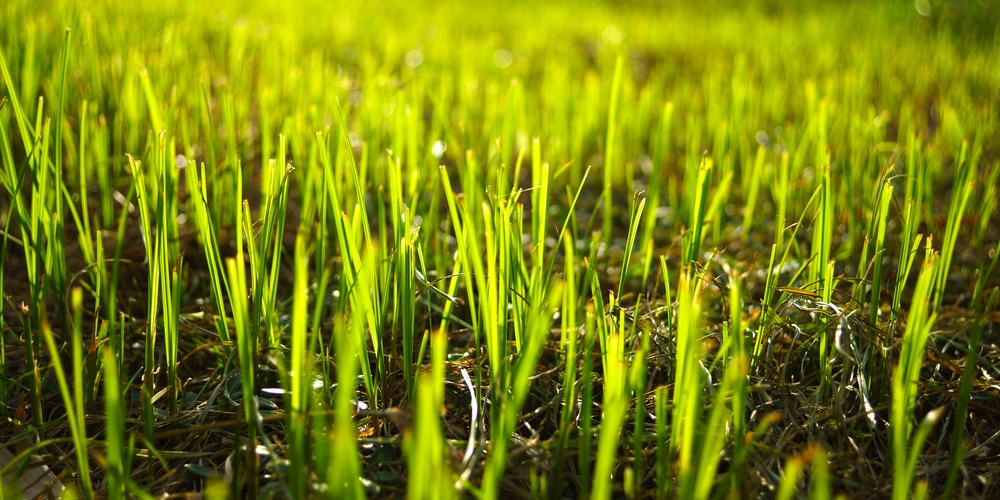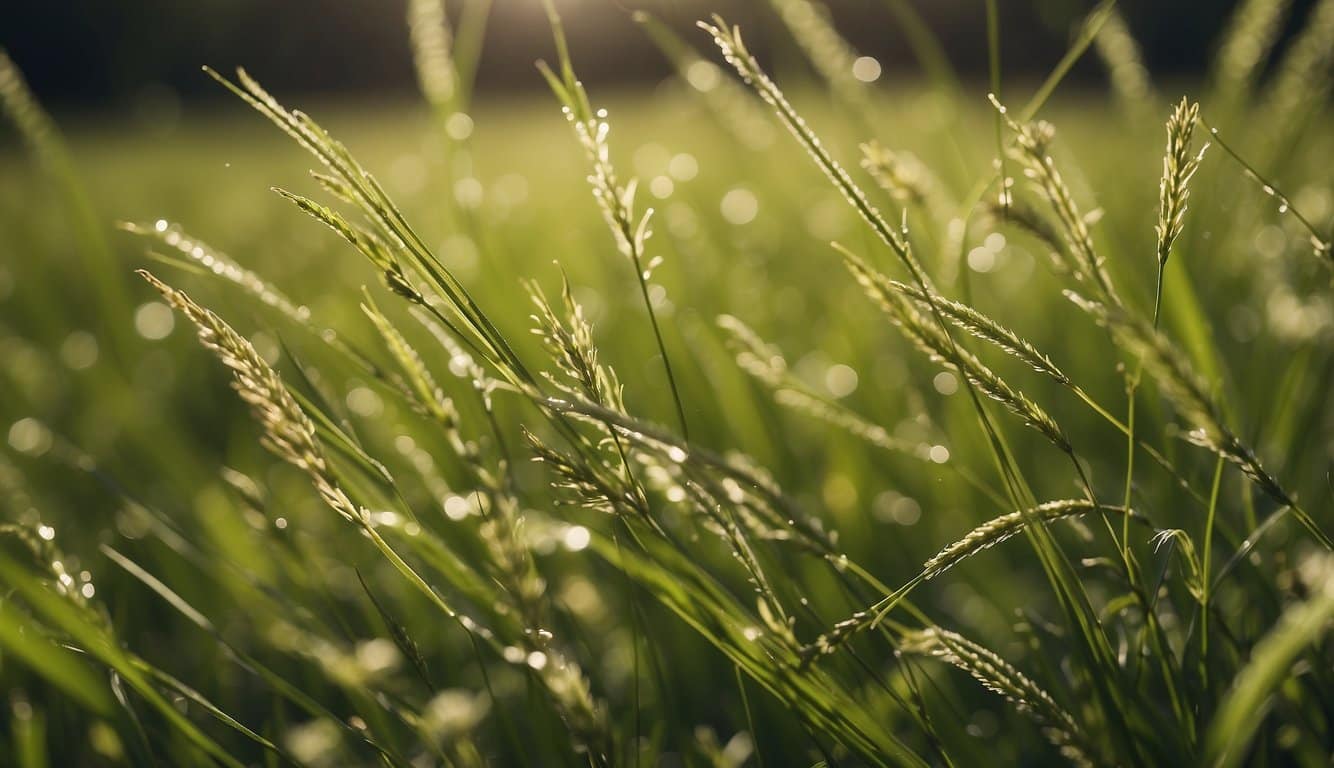Grass Seed Allergies: What You Need to Know
Grass seed allergies are a type of seasonal allergic reaction that can cause a variety of symptoms when you are exposed to grass pollen.
It’s important to recognize and manage these symptoms effectively.
Symptoms can include:
- Sneezing: A common reaction to inhaling pollen.
- Runny or Stuffy Nose: Nasal congestion is often a primary sign.
- Itchy, Watery Eyes: Allergens can irritate eye membranes.
- Skin Irritation: Direct contact with grass may cause rashes.
It’s not just the grass in your yard that might provoke this allergic response. Ornamental grasses also emit pollen and can be culprits in stirring up symptoms.
Grass Pollen Seasons:
| Type of Grass | Typical Pollen Season |
|---|---|
| Bermuda | Late Spring to Summer |
| Ryegrass | Early Spring |
| Fescue | Spring |
| Kentucky Bluegrass | Spring to Early Summer |
To manage these allergies, you’ll want to track pollen counts and limit outdoor activities when counts are high.
Treatment options range from over-the-counter antihistamines to immunotherapy for long-term relief.
Minimize Exposure:
- Keep windows closed during high pollen periods.
- Shower after being outdoors to rinse off pollen.
- Wear a pollen mask when mowing or gardening.
Allergy to grass involves the immune system reacting to grass pollen. This pollen is a fine powder released by grasses to fertilize other grass plants. For someone with a grass pollen allergy, the body mistakes the pollen as a harmful substance, leading to the release of histamines to combat the pollen and causing allergy symptoms.
If breathing difficulties occur, it’s essential to contact a medical professional, as this could indicate asthma triggered by allergies.
It’s always best to seek medical advice for proper diagnosis and treatment tailored to your specific needs.
Symptoms of Grass Seed Allergies
If you find yourself sneezing, itching, or experiencing other discomfort after being around grassy areas, you might be experiencing symptoms of grass seed allergies.
These symptoms can manifest in various ways affecting your respiratory system, skin, and eyes.
Respiratory Reactions
- Runny or Stuffy Nose: You may notice an immediate need to reach for tissues.
- Itchy Throat: There can be an irritating sensation that makes you want to cough or clear your throat frequently.
Characteristics of asthma induced by grass seed allergies include:
- Wheezing or a whistling sound when you breathe.
- A feeling of tightness in your chest.
Skin Irritations
- Direct Contact: If you’ve sat or laid down on grass and then experienced redness or hives, grass seeds could be the culprit.
Recognize these common signs:
- Red, raised welts on the skin’s surface.
- Itchiness that gets more intense with scratching.
Eye Symptoms
- Red, Watery Eyes: Your eyes might become your biggest telltale sign with visible irritation.
- Itching: Just as your skin can itch, your eyes can too, leading to more rubbing and potentially worsening symptoms.
Special note: Protection like sunglasses may help prevent pollen from reaching your eyes, but if symptoms persist, consider consulting a healthcare professional.
Diagnosis and Testing

When you suspect a grass seed allergy, pinpointing the exact cause is crucial. There are specific diagnostic tools that allergists use to determine whether you are allergic to grass pollen.
Skin Prick Tests
Your allergist may perform a skin prick test, which involves:
- Placing a small drop of grass pollen allergen on your skin.
- Gently pricking the area with a needle to introduce the allergen.
- Observing the skin for signs of a reaction, such as redness or swelling, typically within 15-20 minutes.
Blood Tests
Alternatively, blood tests can be used to measure your immune system’s response to grass pollen by checking for:
- The presence of immunoglobulin E (IgE) antibodies that react to specific allergens.
- Levels of these antibodies, which can correlate with the severity of your allergy.
Elimination Diets
Although elimination diets are not commonly used for diagnosing pollen allergies, they can help rule out food-related allergic responses.
If you’ve tried the diets for other allergies and found no relief, it might indicate that airborne allergens like grass pollen are to blame.
Treatment Options
When dealing with grass seed allergies, you have several avenues to alleviate symptoms. The right treatment can make the season more manageable for you. Here are specific methods to consider.
Medications
- Antihistamines: These medications can rapidly ease symptoms like runny noses and itching. For example, cetirizine or fexofenadine are options you may find effective.
- Nasal Corticosteroids: Sprays such as fluticasone or budesonide can reduce inflammation and are useful for daily use during allergy season.
- Decongestants: Products containing pseudoephedrine can provide short-term relief from nasal stuffiness.
- Eye Drops: Ketotifen-containing drops help soothe itchy, watery eyes caused by grass pollen.
Immunotherapy
- Allergy Shots: A long-term solution where you receive injections of increasing amounts of allergens to build up your tolerance.
- Sublingual Immunotherapy: These are tablets placed under the tongue that expose you to small doses of allergens to improve your immune response.
Home Remedies
- Stay Indoors: Limit your outdoor activities when the pollen count is high.
- Clean Air Environment: Use HEPA filters in your home to trap pollen particles.
- Personal Hygiene: Shower and change your clothes after being outside to remove pollen from your skin and hair.
Prevention Strategies
To effectively manage grass seed allergies, you can take proactive steps to reduce exposure to allergens. The strategies are focused on both external environmental control and personal protective measures to minimize symptoms.
Environmental Controls
- Keep windows closed: During high pollen seasons, keep your home and car windows shut to prevent pollen from entering.
- Purify the air: Use HEPA filters in your air conditioning system to capture pollen and reduce indoor allergens.
- Lawn care: Opt for low-pollen grasses and keep the grass short to limit pollen production.
- Timing outdoors: Limit your outdoor activities to late afternoon or after a heavy rain, when pollen counts are lower.
Personal Protective Measures
- Protective clothing: Wear sunglasses and a hat to shield your eyes and head from pollen.
- Change clothes: After being outdoors, change and wash your clothes to remove pollen.
- Shower frequently: Bathe and shampoo your hair daily before bedtime to wash off any lingering pollen.
- Face masks: Consider wearing a pollen mask when doing outdoor activities, particularly yard work or gardening.
Frequently Asked Questions
Navigating the challenges of grass seed allergies can be straightforward when you’re equipped with the right information. This section tackles essential queries to aid in better management of your symptoms.
How can one manage symptoms associated with grass pollen allergies?
- To manage symptoms of grass pollen allergies, you can limit outdoor activities during high pollen days.
- Using air purifiers indoors and keeping windows closed may also help to reduce exposure.
Are there specific foods that should be avoided when dealing with grass allergies?
While no specific foods need to be universally avoided due to grass allergies, some individuals may experience Oral Allergy Syndrome, where certain foods may cross-react with grass pollen and exacerbate symptoms.
What is the typical duration of allergic reactions to grass pollen?
The duration of allergic reactions to grass pollen can vary. It may last as long as you are exposed to the pollen, which could be several weeks throughout the grass pollen season, especially in the spring and summer.
What types of grass are most likely to cause allergic reactions?
Certain types of grasses like Kentucky Bluegrass, Timothy, and Bermuda are known to have a higher likelihood of causing allergic reactions due to the pollen they produce.
Can you provide guidance on antihistamines that are effective for grass pollen allergies?
Antihistamines like cetirizine, loratadine, or fexofenadine can be effective for managing symptoms of grass pollen allergies. These can be purchased over the counter, but consult with a healthcare provider for the best individualized advice.
What actions should people with seed allergies take to avoid reactions?
- People with grass seed allergies should consider wearing protective gear such as masks when handling grass seed.
- Staying informed about the toxicity of grass seed to humans is important.
- Taking preventative measures like not ingesting the seeds are practical steps to avoid reactions.
Last update on 2024-04-29 / Affiliate links / Images from Amazon Product Advertising API



